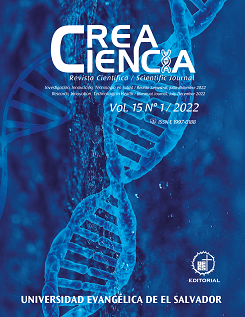Prevalencia de ansiedad y factores académicos relacionados en estudiantes de una Facultad de Medicina de El Salvador año 2021
DOI:
https://doi.org/10.5377/creaciencia.v15i1.15712Palabras clave:
Prevalencia de ansiedad, Factores académicos, estudiantes de la salud, El SalvadorResumen
Los jóvenes universitarios del área de la salud durante su formación académica se ven expuestos a una seria de factores académicos, los cuales en muchos casos se convierten en factores generadores de ansiedad. Por lo tanto, el objetivo de la presente investigación es determinar la prevalencia de ansiedad y los factores académicos relacionados en población universitaria. El enfoque de análisis fue cuantitativo, de tipo observacional, descriptivo, transversal e inferencial. La muestra de 250 personas fue probabilística y estratificada. Los instrumentos utilizados fueron: el Test de Ansiedad de Beck, BAI, y el cuestionario de factores académicos; para la prueba de hipótesis se utilizó la prueba Rho de Spearman, aprobado por el Comité de Ética en fecha 11 junio 2021. Resultados: los hallazgos revelan una prevalencia de ansiedad del 24.72 %; las mujeres presentan una mayor prevalencia de ansiedad en comparación con los hombres. No se encontró relación estadísticamente significativa entre los factores: carga académica, metodología empleada por el docente, personalidad del docente y sistema de evaluación y la variable ansiedad. Finalmente existe una relación positiva y débil entre los factores: horas semanales de estudio, exámenes parciales y modalidad virtual de estudio y la variable ansiedad. Se encontró una prevalencia de ansiedad del 24.72 %, las mujeres presentaron una mayor prevalencia de ansiedad; los factores: carga académica, metodología empleada por el docente, personalidad del docente y el sistema de evaluación no se relacionan con la ansiedad, mientras que los factores: horas semanales de estudio, exámenes parciales y modalidad virtual de estudio, poseen una relación positiva débil.
Descargas
798
pdf (English) 90
Descargas
Publicado
Cómo citar
Número
Sección
Licencia

Esta obra está bajo una licencia internacional Creative Commons Atribución-SinDerivadas 4.0.
© Crea Ciencia
Declaración de originalidad y cesión de derechos
El artículo debe ser enviado con una declaración de originalidad, responsabilidad y cesión de derechos de copia del manuscrito, escaneada y firmada por el autor o por uno de los autores cuando la autoría es colectiva (autor designado), haciendo constar que el texto no ha sido publicado anteriormente en formato impreso o electrónico, que no se presentará a ningún otro medio antes de conocer la decisión de la revista Crea Ciencia y que, de ser aceptado para su publicación, los autores transfieren los derechos de copia en todas las formas y medios conocidos. Al término de seis meses de la publicación, el texto puede ser compartido en otra revista citando la primera versión del artículo publicado en Crea Ciencia y consignando su número y volumen. En caso de no ser publicado el artículo, la UEES accede a retornar los derechos enunciados a sus autores.

Los artículos de Crea Ciencia están publicados en acceso abierto bajo una licencia de Creative Commons Reconocimiento-NoComercial 4.0 Internacional.

